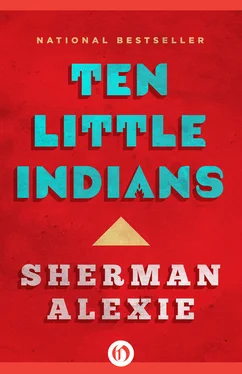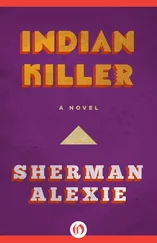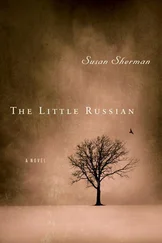“Give it to me,” she said. “I’m here for you, I’m here for you, I’m here for you.”
He felt like a ghost watching a man make love to a woman, and he wondered how a man could completely separate his body from his soul. Can women separate themselves like that? Of course they must be able to. They must have to. Star Girl was not making love to him. She was making love to an imaginary man. His body was inside her body, but who was he inside her mind? Am I her father? Am I her brother, her mother, her sister? Or am I only her Indian?
He flipped her over onto her back and penetrated her again. He pushed and pushed and pushed, and she closed her eyes.
“Look at me,” he said.
She opened her eyes and looked at him. She smiled. How could she smile? She was a stranger with strange ideas.
“Say my name,” he said.
“Harlan,” she said.
She was wrong and didn’t know she was wrong.
“Say my name,” he said again.
“Harlan,” she said. “Harlan Atwater.”
He pulled out of her and crawled off the bed. He ignored her as he quickly dressed, and then he ran out the door, away from her. He ran to the house he shared with his white parents, grabbed the box filled with his self-printed poetry books, and ran back out into the world. He ran twenty-two blocks to Big Heart’s, the Indian bar on Aurora. He threw open the door and strode into the crowded bar like a warrior chief.
“I am a poet!” he screamed to the assembled Indians.
The drunken Indians, those broken men and women, let Harlan be their poet for the night. They let him perform his poems between jukebox songs. They listened and applauded. They hugged and kissed him. They told him his poems sounded exactly like Indian poems were supposed to sound. They recited their poems to him, and asked if their poems were as good as his poems, and he said they were very good, very good, so keep working on them. They all wanted copies of his books. Harlan was so happy he gave them away for free. He autographed 275 books and gave them to 275 different Indians. They all bought him drinks. He didn’t need their charity. He had money. But he wanted to be part of their tribe, their collective, so he drank the free drinks, and he laughed and sang and danced and performed his poems again and again. And yes, he could recite all of them by memory because he loved his poems so much. He asked them if he was Indian, and they said he was the best Indian they’d ever known, and he was happy to hear it, so he drank the free drinks and bought drinks for others, and they all drank together, completely forgetting who had paid for what. He drank more, and the lights and faces blurred, and he could see only one bright red light, and then he could see nothing at all.
Harlan woke the next morning in the alley behind the bar. He staggered to his feet, retched, and emptied his stomach onto a pile of his poetry books lying on the dirty cement. Dry-heaving, he knelt, cleaned his vomit off his books, and read the inscriptions inside:
To Junior, my new best friend, Love, Harlan
To Agnes! Indian Power! From Harlan!
To Hank, who fought in the Nam and don’t give a damn, Harlan
To Pumpkin, who always remembers the elders, Always, Harlan
To Dee, the rodeo queen, from the rodeo king, Harlan
Carrying the damp books, Harlan staggered down the alley and onto the street. Sunrise. The street was empty of cars and people, but Harlan could see a dozen of his books lying abandoned on the street. He knew hundreds of others were lying on hundreds of other streets. Harlan dropped the books he carried, let them join the rest of their tribe, and walked home to his parents.
In the used-book store, Corliss covered her face with her hands. She couldn’t look at the world where such a sad thing could take place.
“Shoot, that’s the thing,” Harlan said. “That’s why I was so surprised to hear one of my books was in the library. In the end, I didn’t write poems. I wrote litter.”
He laughed. Corliss wondered how he could laugh. But she laughed with him and didn’t know why. What was so funny about the world? Everything! Corliss and Harlan laughed until the hearing-impaired bookstore owner probably felt the floor shake.
“So, what lessons can we learn from this story?” Corliss asked.
“Never autograph books for drunk Indians,” he said.
“Never have sex with women named after celestial bodies.”
“Never self-publish your poetry.”
“Never perform at open-mike nights.”
“Never pretend to be an Indian when you’re not,” he said. He took off his glasses and wiped tears from his eyes. Two Indians crying in the back of a used-book store. Indians are always crying, Corliss thought, but at least we’re two Indians crying in an original venue. What kind of ceremony was that? An original ceremony! Every ceremony has to be created somewhere; her Eden was a used-book store. In the beginning, there was the word, and the word was on sale at the local bookstore. That was only natural, she thought, it was apt and justified and ordained. Again, she felt blessed and chosen. She felt young and epic. Can one be young and epic? She didn’t know, but she’d gladly be the first such adventurer, or second, or thirty-third, or one millionth. She was Odysseus, and Harlan was Homer. Or vice versa.
“I never wrote another poem after that night,” Harlan said. “It seemed indecent.”
“I think poetry writing is supposed to feel indecent.”
“Well, maybe. You’re young. I was young, too. And I made a lot of fuss about some fairly inconsequential poems. It’s not like I was famous or rich or talented. I was ordinary, or maybe a little better than ordinary, and I wanted to be more than that, and I couldn’t be, and it hurt for a long time. I think writing poems, I think if I would’ve kept writing them, I would’ve always been reminded of that, of how ordinary I am.”
Corliss wondered what sort of person could continue working jobs that made him feel ordinary. But everybody worked those jobs. Corliss didn’t believe there was a huge difference between the average pizza deliveryman’s self-esteem and Clint Eastwood’s. Or maybe she only wanted to believe there was no real difference. How do small people feel larger? Well, silly, they pretend the large people are smaller. In an ideal world, Corliss thought, everybody weighs 150 pounds!
“Can I ask you a human question?” she asked.
“What’s a human question?” he asked.
“A homeless guy taught me the phrase. I think it’s a variation on a personal question.”
“You’re a strange, strange woman,” he said.
She couldn’t disagree.
“All right,” he said. “Go ahead. Ask away.”
“What have you been doing all these years?”
“I still drive a forklift down on the waterfront. Nothing spectacular. I’m going to retire at the end of the year. I’ve got a big pension coming. It’s good money, honest work, I guess, as long as I don’t think too hard about what’s in the boxes, you know?”
Corliss knew about denial.
“And I take care of my folks,” he said. “I still live with them in the house. That’s why I didn’t let you in. They’re old and sick. They took care of me then. I take care of them now.”
“Were they good parents?” she asked.
“Better than most, I suppose,” he said. “But the thing is, shoot, they could have completely ignored me, and it wouldn’t have mattered much. Because they saved my life. I mean, I know they’re white and I’m Indian, and that’s supposed to be such a sad-sack story, but well, they did, they really saved my life.”
“What do you mean?” she asked.
“Well, shoot,” he said. “I went looking for my real mother once. And it took me a few years, but I found her. She was living alone in Los Angeles. Living in some downtown dive hotel, and she was smoking crack, you know? That’s what my real mother was doing the first time I saw her. I was sitting in my car outside that hotel, because it was scary, you know? And I saw this old Indian woman walking down the street, walking with a cane, and her face was all swollen, and her legs were all swollen. And she had all these sores all over her arms and legs and face. And she looked like a zombie, you know? Like Stephen King’s nightmare Indian.”
Читать дальше












